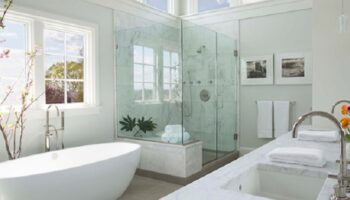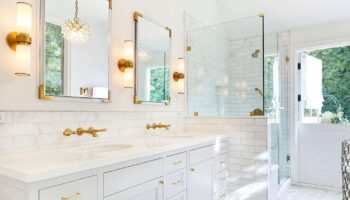Quartz countertops are relatively stain-proof and easy to maintain, as well as nonporous – meaning that bacteria, mold, and mildew won’t build up over time.
Plastic laminate countertops come in various colors and can even imitate other materials’ looks, making it the ideal choice for homeowners who want a unique aesthetic in their kitchen or bathroom.
Durability
Quartz countertops are some of the toughest on the market and typically come backed with generous warranties. Not only are they nonporous and resistant to bacteria build-up, they don’t need resealing like natural stones such as granite and marble do.
Quartz surfaces make an excellent addition to kitchens as they resist juice, oil, wine and other common sources of staining well. Furthermore, their forgiving nature makes them more suitable than hard surfaces like granite and concrete – in fact Consumer Reports conducted rigorous tests comparing engineered stone to natural stone and found that quartz held up better in tests than natural stone.
Quartz countertops offer durability as well as variety when it comes to colors and designs, from creating the illusion of granite or marble surfaces, frosted or speckled patterns for visual interest, matte or shiny finishes and even options for customization.
Quartz excels at concealing seams for a seamless appearance, which is particularly important as seams can detract from its overall aesthetic appeal. While concealing seams entirely is possible with some materials such as marble or slate, doing it with quartz proves much simpler.
As with any countertop material, quartz requires some consideration when purchasing it. Heat can damage its surface; thus it should only be used indoors under cover from direct sunlight and protected by using protective mats or trivets when placing hot pans directly on its surface.
Quartz may not be as brittle as some other countertops, but it still can be scratched easily if improperly installed by inexperienced installers. Mistakes during installation could lead to uneven surfaces or seams which reduce its quality significantly and diminish your countertops over time.
Quartz isn’t as resistant to heat as some materials, meaning that prolonged direct sunlight may lead to cracking or discoloring of its surfaces. If you want your countertops to last as long as possible, cover them with curtains or place them in an outdoor shady area for best results.
Low Maintenance
Quartz countertops are one of the easiest materials to maintain, due to their nonporous surface that doesn’t need sealing like many other countertops such as granite and marble do. Because liquid spills won’t seep into the countertop and stain it like with other materials such as granite and marble do, cleaning off spills quickly is much simpler – ideal for kitchen environments where food products could potentially create bacteria or germs growth.
Due to its durable properties, quartz countertops are less prone to damage than other forms of countertops. Due to its strength and resilience, quartz can withstand scratches and chipping that might occur with other materials if left exposed for too long or subjected to significant amounts of force – meaning you won’t have to worry about damaging them while cooking, cutting, or performing other work activities on them.
Quartz offers another advantage by being resistant to stains and odors, thanks to its nonporous surface that doesn’t absorb liquids as porous materials would, which leads to staining or unpleasant odors absorbing liquids through pores in its composition. Consumer Reports conducted extensive tests comparing quartz with granite countertops on stain resistance; both performed equally well when splashed with grape juice, vegetable oil or coffee – leaving no residual marks left behind!
Quartz counters also don’t exhibit the natural flaws and pits often seen in other kinds of stone, which may turn away potential buyers. This feature should also be taken into consideration if you plan on selling your home in the future; potential buyers are more willing to pay higher prices for homes with low maintenance needs that don’t need frequent replacement or repair work.
Quartz manufactured stone offers an abundance of styling choices to fit into any design theme or color scheme, even mimicking more costly natural stones like marble and granite. Furthermore, manufacturers can even produce customized colors and patterns to replicate more expensive options like these.
Aesthetics
Quartz countertops are an attractive and sophisticated addition to your home that adds significant value. Available in an array of colors and looks like marble-like and concrete-like surfaces, quartz surfaces come with non-porous surfaces that resist staining while being easy to wipe clean – ideal for busy kitchens! Its non-porous surface also resists mildew, mold and bacteria growth while being resistant against mildew, mold and bacteria build-up compared to stone countertops which need regular sealing to prevent stains or damage whereas quartz counters require none such maintenance! You can find countless quartz countertop colors on the market now.
Quartz is manufactured, giving you more options in terms of color and finish choices for your countertops without being subject to natural stone’s variations. This enables you to get exactly the look that you want without compromising style or design, or risk having your counters change appearance over time.
Your quartz countertop’s color and appearance is determined by its manufacturing process. Aggregates are mixed with resins and polymers (and sometimes color pigmentation) before being compressed under high heat and pressure to produce an impervious and nonporous slab that you will install in your kitchen.
Quartz counters come in neutral tones, but many manufacturers also offer them in more dramatic hues such as Arctic White or Marquina Midnight for maximum versatility in interior design schemes ranging from classic to contemporary.
If you’re uncertain of the look you want for your counters, many manufacturers offer samples so that you can see them before making a commitment. This can be an enormous advantage over some alternatives which only allow you to envision what they will look like after installation.
Your new counters should not only make your kitchen appear larger by reflecting light and illuminating it; their shimmering surface makes an impactful statement about high activity spaces such as yours; however, be wary about exposing them to harsh chemicals or cleaners which may cause discoloration or damage over time.
Cost
Quartz counters tend to cost more than other materials, but their long-term value and eco-friendliness make them a smart investment. Natural stone requires much energy in its extraction.
Manufacturers combine 90-95% ground quartz with resins, polymers, pigments, and fillers such as resins or polymers in order to produce this tough yet durable engineered stone material. The end result is non-porous surface which doesn’t need sealing; this gives the effect of marble, granite, or any other natural stones without the need for sealing. Various hues such as fire-engine red, apple green and earthy brown can even be achieved within this mixture; quartz countertops that resemble fine Italian marble veining are possible!
As opposed to natural stone, which must be quarried and transported from its quarrying sites for manufacturing plants, quartz is produced using recycled materials – in fact 90% of it comes from waste byproducts generated during other quarrying and manufacturing processes. Furthermore, Bretonstone technology developed by Italian company Breton uses both recycled raw material as well as natural quartz slabs in order to produce slabs that resemble natural stone in appearance and feel.
Quartz material’s superior strength, durability, and resistance to staining and scratches makes it an excellent choice for kitchen countertops. In fact, many manufacturers provide lifetime warranties against chipping and staining! Unfortunately though, quartz may not be ideal in areas prone to spills and chemicals as its heat resistance may not match other options like granite or crushed glassed. As such, homeowners should exercise caution when placing hot pans and hair styling tools onto the countertop.
Due to their hard surface, quartz counters must be produced in a factory in order to ensure all pieces fit together seamlessly and without flaw. Fabricators use diamond-tipped saws to cut slabs into countertops, sinks, backsplashes and other custom applications with virtually imperceptible seams that ensure continuous surfaces throughout any given room.
Quartz countertops may be more costly than some other countertops due to precision cuts, weight and seaming methods; however, their long-term durability, beauty, and easy maintenance make it an attractive option for homeowners looking to enhance their kitchens with long-term surfaces.






